Taschen Basic Art
2 total works
Andy Warhol (1928–1987) is hailed as the most important proponent of the Pop art movement. A critical and creative observer of American society, he explored key themes of consumerism, materialism, media, and celebrity.
Drawing on contemporary advertisements, comic strips, consumer products, and Hollywood’s most famous faces, Warhol proposed a radical reevaluation of what constituted artistic subject matter. Through Warhol, a Campbell’s soup can and Coca Cola bottle became as worthy of artistic status as any traditional still life. At the same time, Warhol reconfigured the role of the artist. Famously stating “I want to be a machine,” he systematically reduced the presence of his own authorship, working with mass-production methods and images, as well as dozens of assistants in a studio he dubbed the Factory.
This book introduces Warhol’s multifaceted, prolific oeuvre, which revolutionized distinctions between “high” and “low” art and integrated ideas of living, producing, and consuming that remain central questions of modern experience.
Peaking in the 1960s, Pop Art began as a revolt against mainstream approaches to art and culture and evolved into a wholesale interrogation of modern society, consumer culture, the role of the artist, and of what constituted an artwork.
Focusing on issues of materialism, celebrity, and media, Pop Art drew on mass-market sources, from advertising imagery to comic books, from Hollywood's most famous faces to the packaging of consumer products, the latter epitomized by Andy Warhol's Campbell's soup cans. As well as challenging the establishment with the elevation of such popular, banal, and kitschy images, Pop Art also deployed methods of mass-production, reducing the role of the individual artist with mechanized techniques such as screen printing.
With featured artists including Andy Warhol, Allen Jones, Ed Ruscha, Robert Indiana, Jasper Johns, Robert Rauschenberg, and Roy Lichtenstein, this book introduces the full reach and influence of a defining modernist movement.

